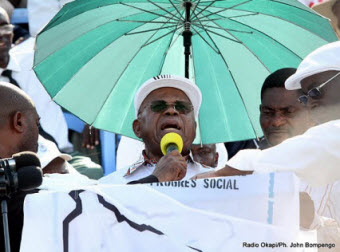
At least 50,000 people attended veteran opposition leader Etienne Tshisekedi first big rally in Kinshasa on Sunday, ahead of the presidential election due later this year. Many more supporters were refused entry to the packed Stade Tata Raphael.
In a 45-minute speech in Lingala, the president of the Union for Democracy and Social Progress (UDPS) painted a bleak picture of the state of the country under the leadership of President Joseph Kabila.
He decried the lackluster plight of state-owned companies like GECAMINES, ONATRA, and MIBA. He said that corruption – and not the lack of revenues – had rendered electric power supplier SNEL and water supplier REGIDESO unable to provide adequate services nationwide.
On human rights, Mr. Tshisekedi said that the murder of prominent human rights activist Floribert Chebeya last year shows how bold the authorities have become in their attempts to suppress opposing views and quiet those they see as adversaries.
He called on his supporters to vote for him and register for the presidential election. He said that any delay of elections beyond the constitutionally allowed period would be unacceptable.
Although officials in Kinshasa had previously said the rally could not take place at Stade Tata Raphael, they finally relented last week after the UDPS insisted the event would go on with or without their approval.
The rally was symbolically held on the 21st anniversary of the day former President Mobutu Sese Seko introduced a multiparty system in the country, bowing to pressure from opponents led by Tshisekedi and others.
After fighting for democracy for more than three decades, Mr. Tshisekedi boycotted the elections held in 2006 and called on his supporters not to register.
He returned home last December after a three-year absence due to health reasons.
In January, President Kabila's allies in parliament quickly passed a constitutional amendment scrapping a second round of voting in future presidential elections, a move seen as helping his chances of reelection.
Although Mr. Tshisekedi is well-positioned to be named as the flag bearer for the opposition in this year's presidential election, the leading parties have so far failed to reach an agreement on one candidate and a common strategy, making it more likely that President Kabila will face a divided opposition.
Related articles
- • DRC and Rwanda Sign Declaration of Principles for Peace in Eastern Congo (April 25, 2025)
- • UK Suspends Financial Aid to Rwanda Over M23 Rebellion (February 25, 2025)
- • Tshisekedi Announces Government of National Unity and Calls for Unity Against M23 Rebels (February 23, 2025)
- • Rwanda-Backed M23 Rebels Summarily Executed Children in Bukavu, UN Reports (February 19, 2025)
- • DR Congo Citizens Head to Polls to Elect President, Members of Parliament (December 20, 2023)
- • Felix Tshisekedi Sworn In as DR Congo President (January 24, 2019)
- • Constitutional Court Declares Tshisekedi Winner of Presidential Election (January 19, 2019)
- • Martin Fayulu Challenges Presidential Election Results in Court (January 12, 2019)
- • Felix Tshisekedi Vows to Be the President of All Congolese (January 10, 2019)
- • Martin Fayulu Rejects Presidential Election Results (January 10, 2019)
- • Felix Tshisekedi Elected DR Congo President (January 10, 2019)
- • DR Congo Delays Results of December Election (January 6, 2019)
- • Bemba, Katumbi renew their support for joint opposition presidential candidate Fayulu (November 16, 2018)
- • Vital Kamerhe also withdraws support for joint opposition presidential bid (November 12, 2018)
- • Felix Tshisekedi withdraws support for joint opposition presidential bid (November 12, 2018)
- • Jean-Pierre Bemba banned from running for president (August 25, 2018)
- • Vital Kamerhe named UNC presidential candidate (August 4, 2018)
- • Bemba says Katumbi should be allowed to run for president (August 4, 2018)
- • Moise Katumbi blocked from entering DR Congo (August 3, 2018)
- • Jean-Pierre Bemba Returns to DR Congo (August 1, 2018)
- • Jean-Pierre Bemba named MLC presidential candidate (July 13, 2018)
- • Botswana Urges Joseph Kabila to Step Down (February 26, 2018)
- • No elections in DR Congo in December without electronic voting machines: INEC (February 13, 2018)
- • US Warns DR Congo Against Electronic Voting for Delayed Election (February 12, 2018)
- • Presidential election scheduled for December 23, 2018 (November 5, 2017)
- • Felix Tshisekedi accuses INEC of illegally prolonging Kabila's mandate (October 24, 2017)
- • DRC Seeks Arrest of Presidential Candidate Moise Katumbi (May 19, 2016)
- • Papa Wemba Is Buried in Kinshasa (May 4, 2016)
- • Papa Wemba Awarded Highest National Honor as Thousands Pay Tribute (May 2, 2016)
- • Peacekeepers, Congo Army to Resume Joint Fight Against Rwandan Rebels (January 28, 2016)







